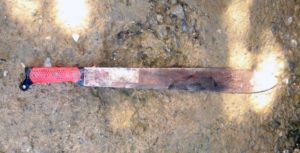The young pastor strained under the weight of the bleeding man he supported. “He is my brother.”
He labored to keep the wounded man upright. The machete blade had gone deep.
“How did it happen?”, I asked, as my nurse-wife entered from a side room and approached to lend aid.
“My brother has a friend. The friend sent my brother to collect money owed him by another man.”
I took in the unfolding story as we all helped the wounded brother out of his coat, it’s back soaked through in red.
“The man owing money was drinking beer and got angry when my brother told him why he came. My brother decided to leave and come back another time. But the man had taken up a panga (machete). When my brother turned to go out, it was then he was slashed, before he could reach to the outside.”
Ann had brought out a sizable roll of gauze. By now his shirt had been removed and, with strips of old sheets and tape, she bound his bare torso. The panga had opened a V-trench some eight inches long – vertically, between spine and shoulder blade. She wrapped the material about his torso several times, in hopes it might slow the blood, buying us time to get him to the clinic where they could sew him up.

The government-sponsored clinic, a thinly-equipped medical outpost established to serve the Wakuria clans, sat at the edge of the village nearest us, five miles to the north.
Life was hard for the tribal people, often heartbreaking. It was a rare home that had not lost at least one child to malaria.
And there were the skirmishes.
With cultures of the region given to decades-old feuds – mostly to do with livestock – violence could erupt in a heartbeat. Kuria country lay bordering other cattle-tending families – the Maasai, the Luo, the Kipsigis. Bands of spear-wielding parties of either tribe, trekking by foot in their stated quest to take back rustled livestock, had become a common image.
I grew to slow the bug down on our dusty road and roll gently past the occasional vigilante parties. We couldn’t guess when a band might come into view on the twenty mile drive to our mail box (we checked for letters once, sometimes twice, weekly). Though as a missionary family we did not feel directly threatened, our verbal charge to the back seat passengers came with regularity, “Roll your windows up, kids.”
The task at hand just now was to get a terribly wounded young Kuria to a place for treatment.
I hope the doctor is in.
©2017 Jerry Lout


 ***
***